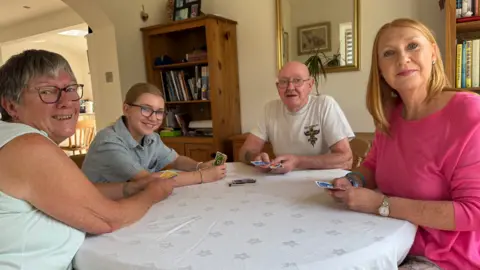BBC News, Guernsey
 BBC
BBCA family who have been living with three generations under one roof for nearly a decade say choosing to live together was a “no-brainer”.
Sarah Clayton bought a house with her parents and daughter in 2016 following the death of her husband.
The family is one of many across the island choosing live in such a way to save money on rent, child care and nursing homes.
Mrs Clayton said that everyone sometimes got annoyed with others but “we make allowances”.
Having space
Nearly 20% of households in Guernsey are made up of three or more adults aged 16 or over, with about half of those also having a child living there too.
However, this figure does not give specific numbers of those living in multi-generational households.
As a result of her circumstances, Sarah said it seemed that living together was the best option.
She said: “It just changed my perspective of how we wanted to live.
“I thought not having a husband was going to be tricky, so I said to mum and dad: ‘How about I sell my house, you sell your house and we live together?
“‘You will be able to help look after [her daughter] Scarlet and, when you get older, I can look after you.’ It was a no-brainer.”
There are always challenges for any family living together.
However, with three generations, sometimes more, in the same house, it was important to give each other space, the family said.
Sarah said: “We’ve grown together.
“I had a way of living they had a way of living. Yes, they would annoy me and I would annoy them at points, but we’ve come to understand we make allowances.”
However, constructing multi-generational homes is not yet standard practice for builders, according to housing expert Henry Prior.
He told BBC News: “We’re not, I’m afraid, seeing that kind of imagination when it comes to house developers.
“We often see it when we talk to people who are building their own houses.
“House developers are a bit like car manufacturers. You don’t find them making two-seater sports car which are readily adaptable into family estates.
“They like people who will sell their sports car and then buy a new car, and so it is with house builders and developers.
“What we do need though is some forethought on this.”
A spokesperson from the Planning Service said: “While there aren’t set standards that new housing developments are required to meet to specifically accommodate multi-generational living, in the last political term, revised supplementary planning guidance on ancillary or associated living accommodation units was published to support multi-generational living in existing housing.
“This superseded the old dower unit [possible separate living space on a property] guidance and reflects the more flexible approach under the current Island Development Plan.
“This makes it easier to create ancillary units, even outside of the main and local centres.”
There are families looking to live in multi-generational households, experts say.
For estate agent Swoffers, of about 70 local market offers in at the moment, two were looking for that option and there were other suitable houses for sale.
Andre Austin, director of local market sales, said that, although it was no more prevalent in Guernsey now than 20 years ago, multi-generational households did suit some.
He said: “Maybe they are at a later stage of life and they have younger members of family on tap to help them.
“The challenge is with these sorts of properties that you aren’t just satisfying two people.
“It could be four, five, six people, and you need to ensure everyone is happy.”


